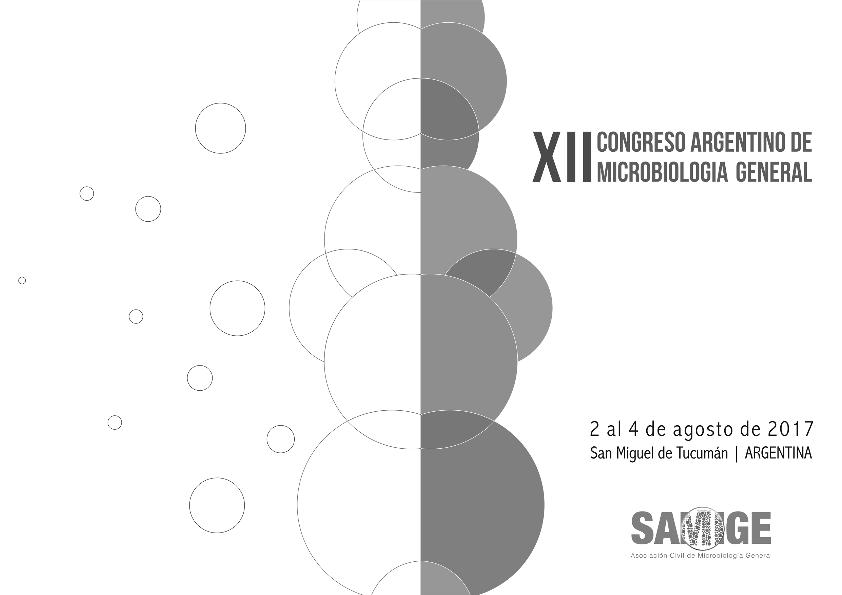Mostrar el registro sencillo del ítem
dc.contributor.author
Rulli, Macarena María

dc.contributor.author
Alvarez, Analia

dc.contributor.author
del Gobbo, Luciana Melisa

dc.contributor.author
Fuentes, María Soledad

dc.contributor.author
Colin, Veronica Leticia

dc.date.available
2023-02-17T13:32:35Z
dc.date.issued
2017
dc.identifier.citation
Characterization and properties of a microbial emulsifier produced from crude glycerol; XII Congreso Argentino de Microbiología General; San Miguel de Tucuman; Argentina; 2017; 1-2
dc.identifier.uri
http://hdl.handle.net/11336/188363
dc.description.abstract
Bioemulsifiers (BE) are amphipathic molecules used in the bioremediation field due to the role in emulsification, solubilization, and removal of hydrophobic compounds from the environment. The ability of a spore-forming bacterium to produced BE using crude glycerol as a cheap feedstock was previously detected. In the current study, partially purified BE was characterized. The ability of the microbial product and of two commercial synthetic agents such as sodium dodecyl sulfate (SDS) and Triton X-100 (TX-100) to emulsify hydrophobic substrates was also comparatively evaluated.Culture supernatant containing BE was filtered through a dialysis tubing cellulose membrane (Typical molecular weight cut-off = 14,000 Da). The concentrate obtained was then used as BE source, and subjected to hydrolytic treatments with proteinase K (30 U mg −1 at 37 °C for 4 h), commercial lipasefrom Candida rugosa(100 U mg −1 at 37 °C for 1 h), and acid hydrolysis (10% HCl at 100 °C for 10 min) in order to estimate the role of peptides, lipids and sugars on the BE nature. The biodegradability of BE, SDS and TX-100 was assayed using the BOD/COD ratio, with BOD and COD as the biological and chemical oxygen demand, respectively. BOD and COD parameters were determined according to the Standard Methods for the Examination of Water and Wastewater. Finally, it was evaluated the emulsifying ability of the three agents on hydrophobic substrates (kerosene, toluene, chloroform, chlordane pesticide and vegetable oils), determining the emulsification index for each substrate after being left to settle for 24 h (E 24). All hydrolytic treatments significantly reduced the BE activity on the kerosene, suggesting that microbial product could have a protein fraction as well as sugar and lipid fractions. On the other hand, a virtually negligible BOD/COD ratio was detected for SDS and TX-100 (0.070−0.172), confirming the extremely low biodegradability of these synthetic products. However, BOD/COD ratio was significantly increased for BE (0.386) confirming so its biodegradable character. Finally, a differential performance of the BE, SDS, and TX-100 to emulsify the hydrophobic compounds was detected: a similar performance of the three agents to emulsify substrates as kerosene and toluene were detected, with E 24 -values of 61% and 62%, respectively. However, chloroform was only effectively emulsified by the BE, with an E 24 -value increased 4-fold compared to those detected for the synthetic agents. While SDS had poor ability to emulsify a pesticide such as chlordane (E24 = 18%), the BE and TX-100 wereoptimal emulsifying agents for this substrate, with similar E 24 -values between them (61%). Finally, only the BE was able to emulsify vegetable oils as sunflower, canola, and grape, with E24 -values that ranged from 38% to 51%. These results could encourage the application of a biodegradable microbialproduct to achieve the effective removal of hydrophobic pollutants, without detriment to the environment.
dc.format
application/pdf
dc.language.iso
eng
dc.publisher
Asociación Civil de Microbiología General
dc.rights
info:eu-repo/semantics/openAccess
dc.rights.uri
https://creativecommons.org/licenses/by-nc-sa/2.5/ar/
dc.subject
MICROBIAL EMULSIFIER
dc.subject
CRUDE GLYCEROL
dc.subject
SYNTHETIC SURFACTANTS
dc.subject
BIODEGRADABILITY
dc.subject.classification
Biotecnología Medioambiental

dc.subject.classification
Biotecnología del Medio Ambiente

dc.subject.classification
INGENIERÍAS Y TECNOLOGÍAS

dc.title
Characterization and properties of a microbial emulsifier produced from crude glycerol
dc.type
info:eu-repo/semantics/publishedVersion
dc.type
info:eu-repo/semantics/conferenceObject
dc.type
info:ar-repo/semantics/documento de conferencia
dc.date.updated
2023-02-10T17:54:00Z
dc.journal.pagination
1-2
dc.journal.pais
Argentina

dc.journal.ciudad
San Miguel de Tucuman
dc.description.fil
Fil: Rulli, Macarena María. Consejo Nacional de Investigaciones Científicas y Técnicas. Centro Científico Tecnológico Conicet - Tucumán. Planta Piloto de Procesos Industriales Microbiológicos; Argentina
dc.description.fil
Fil: Alvarez, Analia. Consejo Nacional de Investigaciones Científicas y Técnicas. Centro Científico Tecnológico Conicet - Tucumán. Planta Piloto de Procesos Industriales Microbiológicos; Argentina
dc.description.fil
Fil: del Gobbo, Luciana Melisa. Universidad Nacional de Tucumán. Facultad de Bioquímica, Química y Farmacia; Argentina. Consejo Nacional de Investigaciones Científicas y Técnicas. Centro Científico Tecnológico Conicet - Tucumán; Argentina
dc.description.fil
Fil: Fuentes, María Soledad. Consejo Nacional de Investigaciones Científicas y Técnicas. Centro Científico Tecnológico Conicet - Tucumán. Planta Piloto de Procesos Industriales Microbiológicos; Argentina
dc.description.fil
Fil: Colin, Veronica Leticia. Consejo Nacional de Investigaciones Científicas y Técnicas. Centro Científico Tecnológico Conicet - Tucumán. Planta Piloto de Procesos Industriales Microbiológicos; Argentina
dc.relation.alternativeid
info:eu-repo/semantics/altIdentifier/url/https://samige.org.ar/wp-content/uploads/2022/10/Libro-SAMIGE-2017.pdf
dc.conicet.rol
Autor

dc.conicet.rol
Autor

dc.conicet.rol
Autor

dc.conicet.rol
Autor

dc.conicet.rol
Autor

dc.coverage
Nacional
dc.type.subtype
Congreso
dc.description.nombreEvento
XII Congreso Argentino de Microbiología General
dc.date.evento
2017-08-02
dc.description.ciudadEvento
San Miguel de Tucuman
dc.description.paisEvento
Argentina

dc.type.publicacion
Book
dc.description.institucionOrganizadora
Asociación Civil de Microbiología General
dc.source.libro
XII Congreso Argentino de Microbiología General
dc.date.eventoHasta
2017-08-04
dc.type
Congreso
Archivos asociados
